This vegan chicken tikka masala will knock your socks off! Seriously. It’s probably the best vegan chicken tikka masala you’ll ever try! The combination of spices and carefully selected ingredients make this curry absolutely explode with flavour. The masala sauce is every bit as creamy and delicious as the “real” thing, without any animal suffering involved. This vegan chicken tikka masala is so tasty, creamy and satisfying your guests won’t even notice it’s not real chicken.
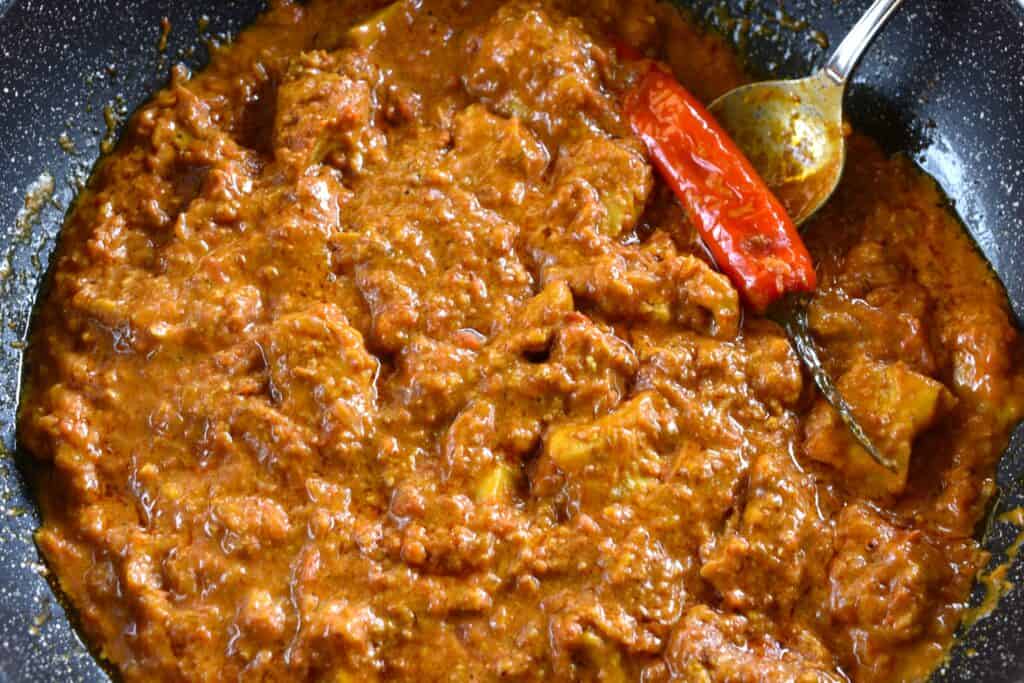
I’ve been a curry lover ever since I can remember. Britain was dubbed the curry nation by the Indian-British cook and writer Madhur Jaffrey, and we Brits have certainly lived up to the reputation! Britons love curry. I grew up eating it, and I still eat it at least once a week, even now that I live in Switzerland. Thanks to the Tamil (Sri Lankan) community here in Switzerland, Indian and Asian ingredients are readily available, and I can find everything I need to make all those glorious Indian curries! Tikka masala (also called CTM for short) is easily the most popular Indian curry in the UK.
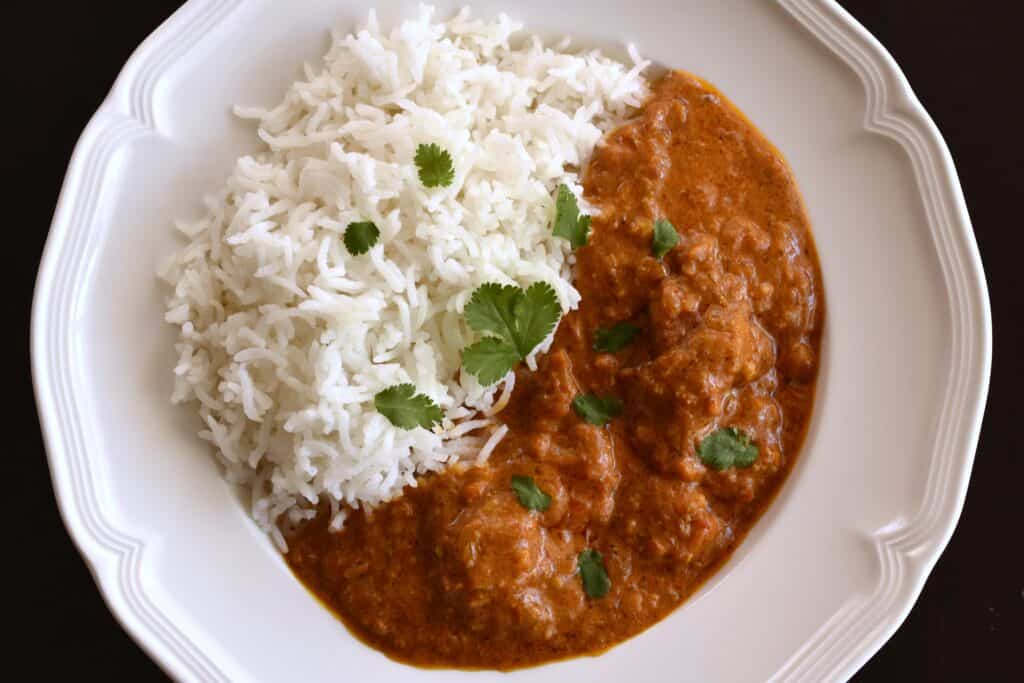
Origins of chicken tikka masala
For those of you who, like me, are curious about anything and everything, especially food, I’ve been rabbit-holing again and found some interesting facts about chicken tikka masala. This iconic dish is possibly not truly Indian. In the sense that it probably didn’t originate in India. Rather, it seems the dish was created in Britain by Indian chefs. The chefs may not even have been Indian. Some sources claim they were Pakistani or Bangladeshi. Historians of ethnic food, Peter and Colleen Grove, have gone so far as to conclude that the dish “was most certainly invented in Britain”. What is certain is that chicken tikka masala has been voted the UK’s most popular dish!
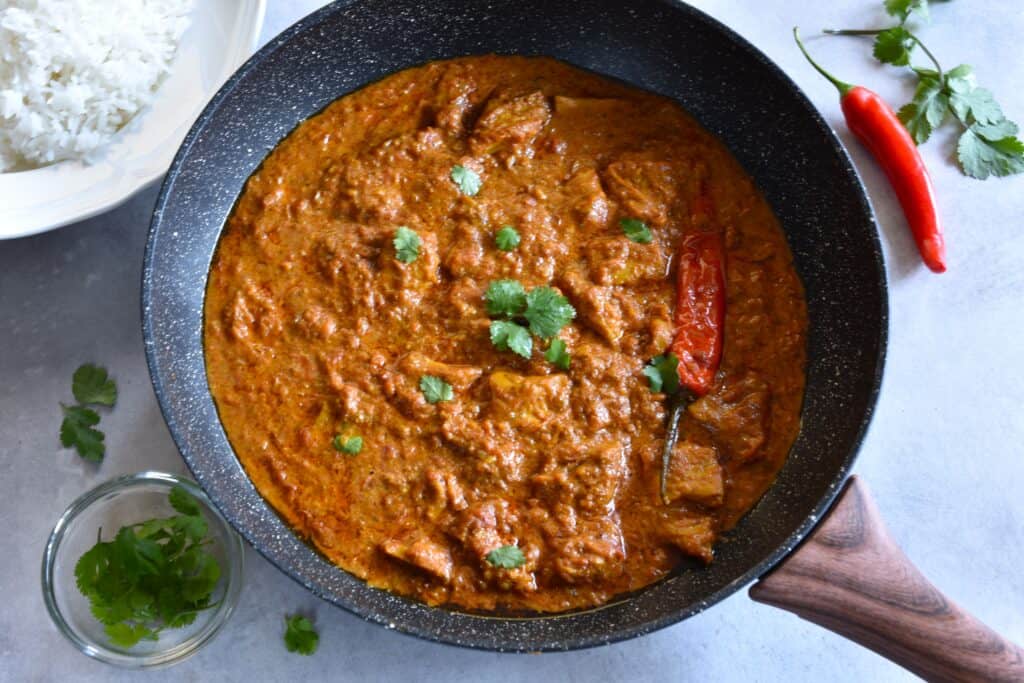
A quick dive into my curry past
My love affair with Indian food began as soon as I tasted it, and I’ve been making curries ever since I was in my late teens. While I was working in Scotland, during an internship which was part of the hotel and catering management course I was doing at the time, I met a guy called Roy Jack. Roy worked as a chef in the local Indian restaurant, and it was from him that I got my first tips and tricks on how to make great Indian curries. He didn’t teach me how to make chicken tikka, but he did ignite a passion for cooking Indian food, which has lasted a lifetime. Thanks, Roy! I can’t thank you enough for that, even though there’s not much chance you’ll ever read this.
Over the years, I’ve developed some pretty good cooking skills, specialising in Italian, Indian, British and Swiss cuisines, all of which are very close to home for me. I first started making chicken tikka masala many, many years ago after eating it at a restaurant. When I became vegetarian and later vegan, I had to relearn a lot of stuff – how to replace animal products and how to cook again using new ingredients that were unfamiliar to me. Although it’s been a steep learning curve, I wasn’t deterred and actually embraced giving up animal products as a very welcome challenge. Lots of Indian food is naturally vegan, or at least vegetarian, so I had an easy job there.
About this recipe
Chicken tikka masala was actually one of the easiest recipes to veganise because the only ingredients I had to substitute were chicken and cream. I consider this recipe one of my major accomplishments and certainly one of my favourites. Today, I’m sharing it with you, and I promise, it has nothing to envy compared to the original!
What can I use instead of chicken in tikka masala?
I’ve used planted. vegan chicken in this recipe. This can easily be substituted with jackfruit, chickpeas, aubergines (eggplant), potatoes, or tofu if you prefer. Although I’m always careful about what I eat and mostly choose healthy options, I find it hard to object to a plant-based meat alternative like planted. With just 4 ingredients – all of them natural – it really is a great substitute for real chicken.
Marinating the vegan chicken tikka (tikka means pieces or chunks) and cooking it in masala sauce (masala means spice mix used in Indian cooking) makes this dish absolutely explode with flavour! If you don’t have time to marinate, just omit the first five steps in the recipe card below. Start by making the paste for the masala sauce and add the vegan chicken chunks in step 4, just before you add the tomato pulp. Coat the pieces well in the past, and your curry will still be very tasty and satisfying, even without marinating the vegan chicken. If you can plan ahead and marinate, your efforts will be rewarded with an outstanding dish.
Don’t be put off by the lengthy ingredient list – this dish is actually really easy to make! After marinating, the tikka chunks are shallow fried until golden brown and then added to the masala sauce, which is made of spices, onion, garlic, ginger, tomato and coconut milk. Below, you will find easy step-by-step instructions with photos, so you can’t go wrong!
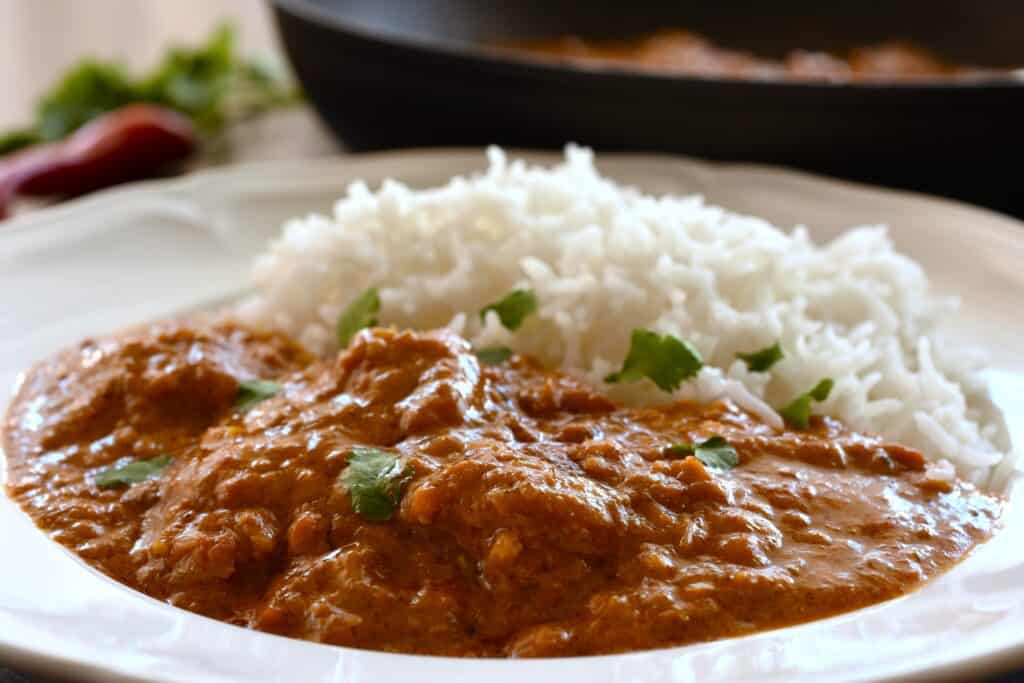
How to make vegan chicken tikka masala
Even though this recipe has a long list of ingredients, most of them are spices that you probably already have in your pantry or are easy to find at Indian grocery shops. The recipe is actually very easy to make.
Ingredients
For the exact quantities, see the recipe card below.
Vegan chicken – I use plain, unseasoned planted. chicken (see photo below). Planted. is a Swiss company based in Kemptthal, near Zürich. Founded in 2019, they specialise in plant-based meat substitutes that contain clean ingredients with no additives. Planted. products are available in Switzerland, Germany, France, Italy and the UK. Planted. chicken has only 4 ingredients: peas, water, rapeseed oil and vitamin B12.
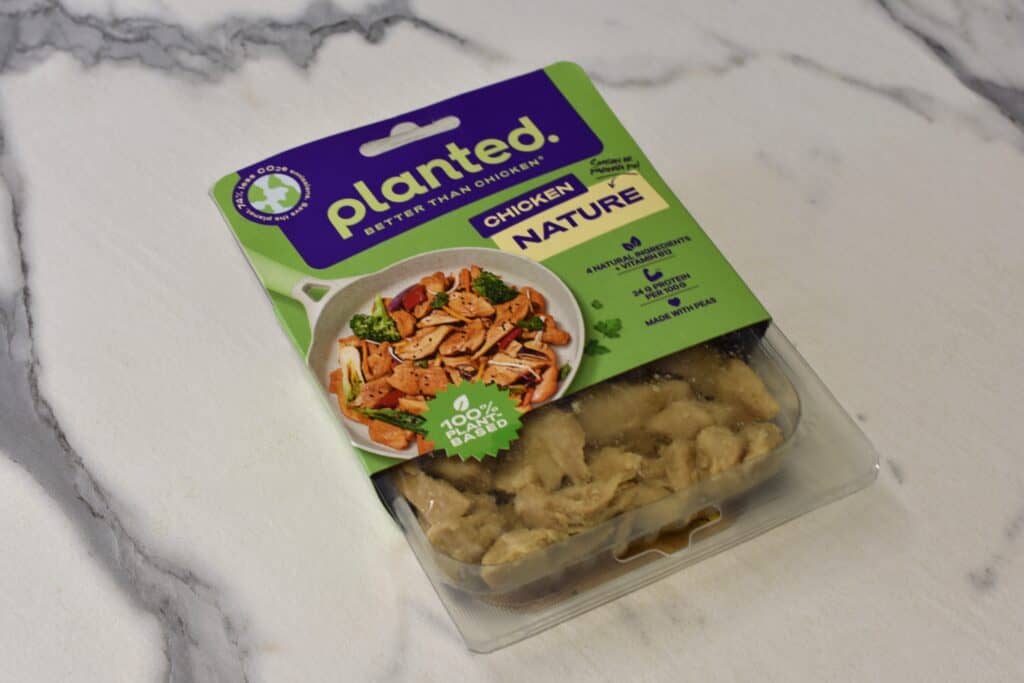
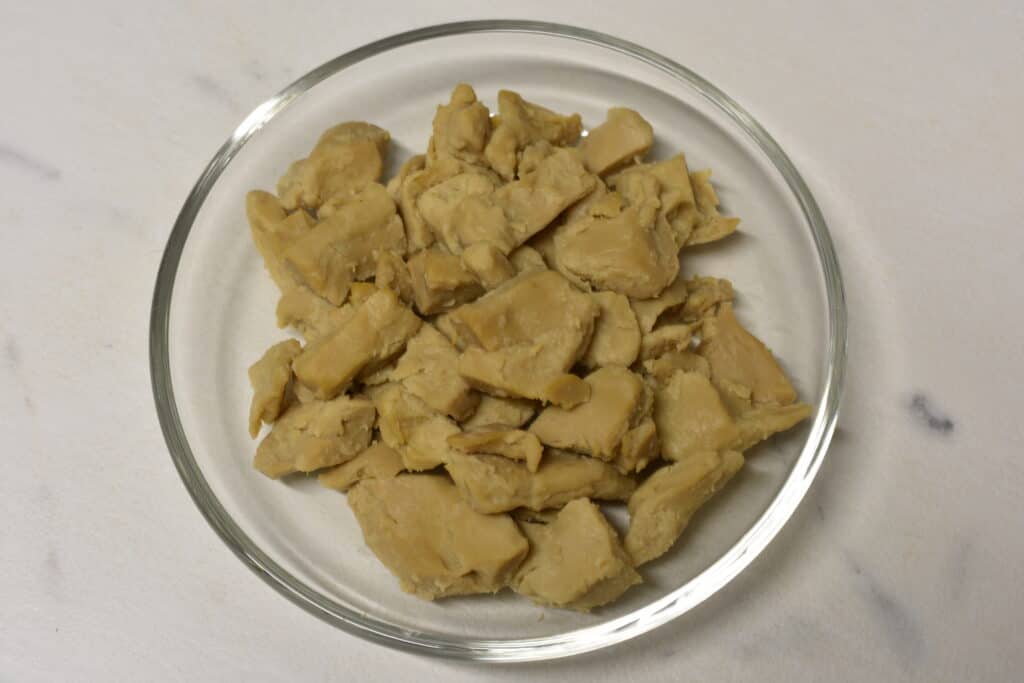
For the marinade
- Coriander seeds
- Cumin seeds
- Peppercorns
- Clove
- Cardamom (seeds only – discard the pods)
- Kasoori methi (aka kasuri methi or dried fenugreek leaves)
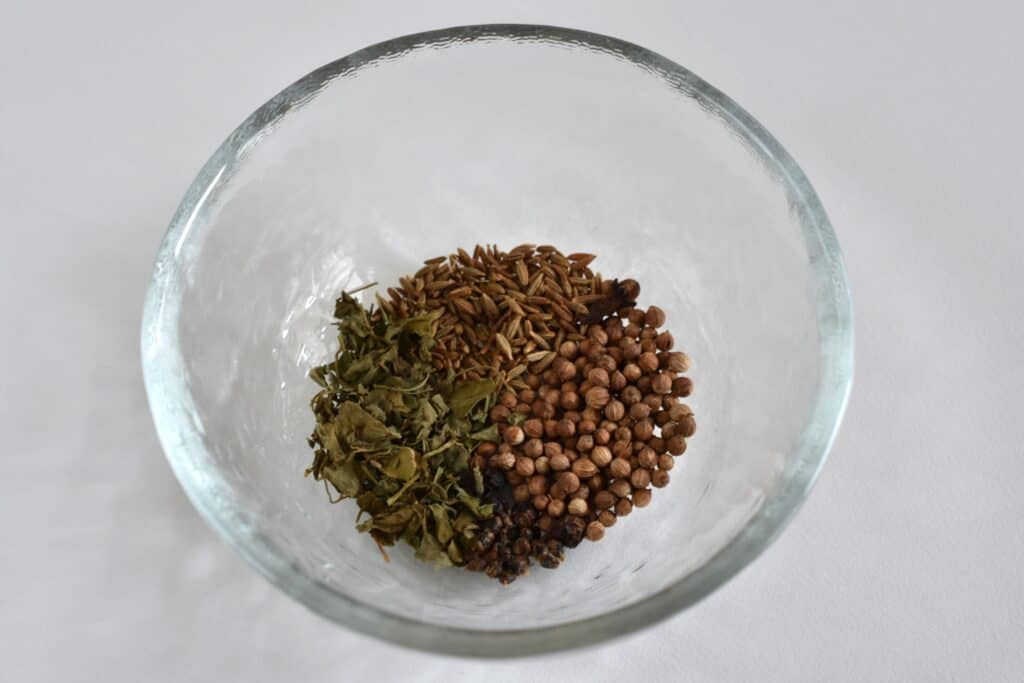
- Soya yoghurt – I find it’s best to use unsweetened soya yoghurt. If you want, you can substitute it with another plant-based yoghurt of your choice.
- Ginger – Use fresh, grated ginger for the marinade. If fresh ginger is unavailable, you could substitute it with dried ginger.
- Garlic – Fresh, minced garlic is best for this marinade.
- Lemon juice – Again, freshly squeezed lemon juice will give the best results.
- Oil – I use olive oil, but you can substitute it with any vegetable oil of your choice.
- Indian red chili powder or cayenne pepper – This provides most of the heat in this recipe. If you’re not a fan of hot curries, go easy on the chili.
- Turmeric powder – If you want to use fresh turmeric instead, by all means, do.
- Mild paprika powder – This is one of the ingredients that give this curry its deep orange colour, so don’t omit it.
- Salt – I use Guérande unrefined sea salt for all my recipes.
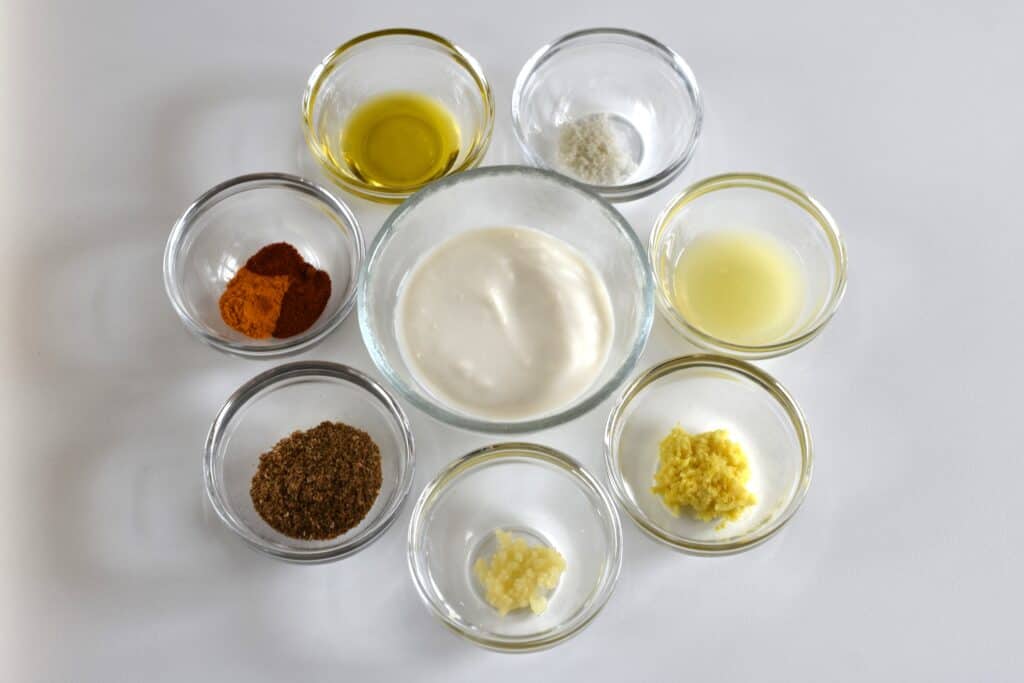
For the masala sauce
See the recipe card below for the exact quantities
- Coconut oil
- Whole red chili pepper
- Coriander powder
- Cumin powder
- Turmeric powder
- Hot paprika powder – If you don’t like your curry hot, use mild paprika instead.
- Asafoetida (also known as hing)
- Garam masala
- Onion – yellow onion, finely chopped.
- Ginger – fresh, grated.
- Garlic – fresh garlic, minced.
- Salt – I use Guérande unrefined sea salt in all my recipes.
- Tomato pulp – I use Mutti tomato pulp. If the pulp contains lumps of tomato, blend it until it’s almost smooth.
- Coconut milk – I recommend using coconut milk because it makes the best sauce in terms of texture and taste.
- Cayenne pepper – to taste.
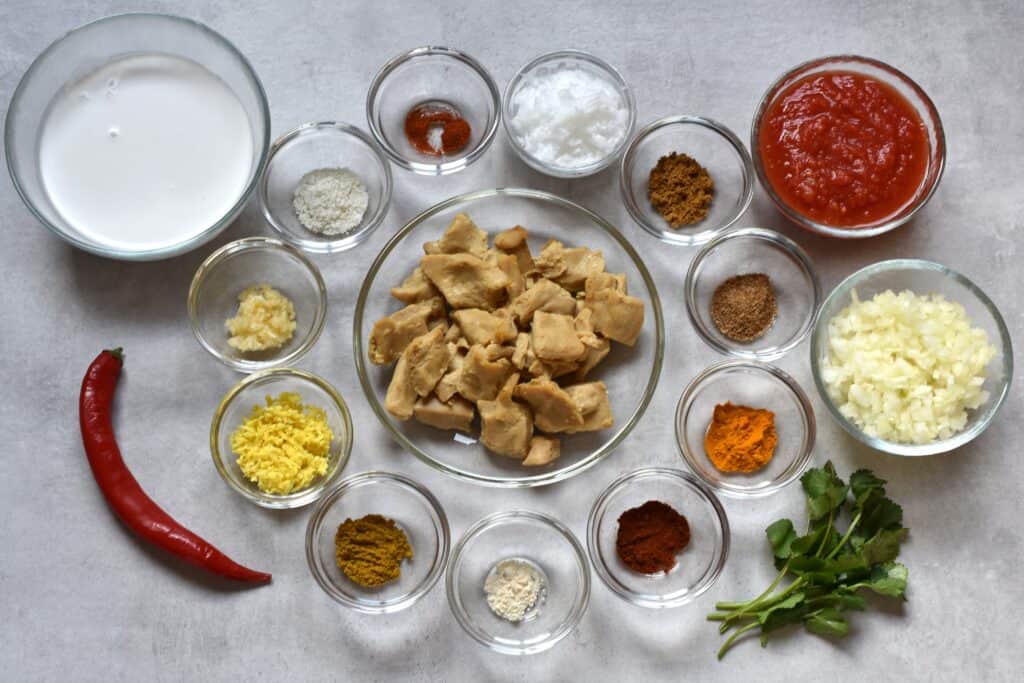
Method
In the recipe card below, you’ll find step-by-step instructions with photos.
Marinate the vegan chicken
Grind the spices to a fine powder. Add the spices to the rest of the ingredients for the marinade. Mix well and refrigerate for at least an hour. The longer the vegan chicken pieces remain in the marinade, the more flavoursome they become. Marinating overnight makes for great-tasting tikka chunks.
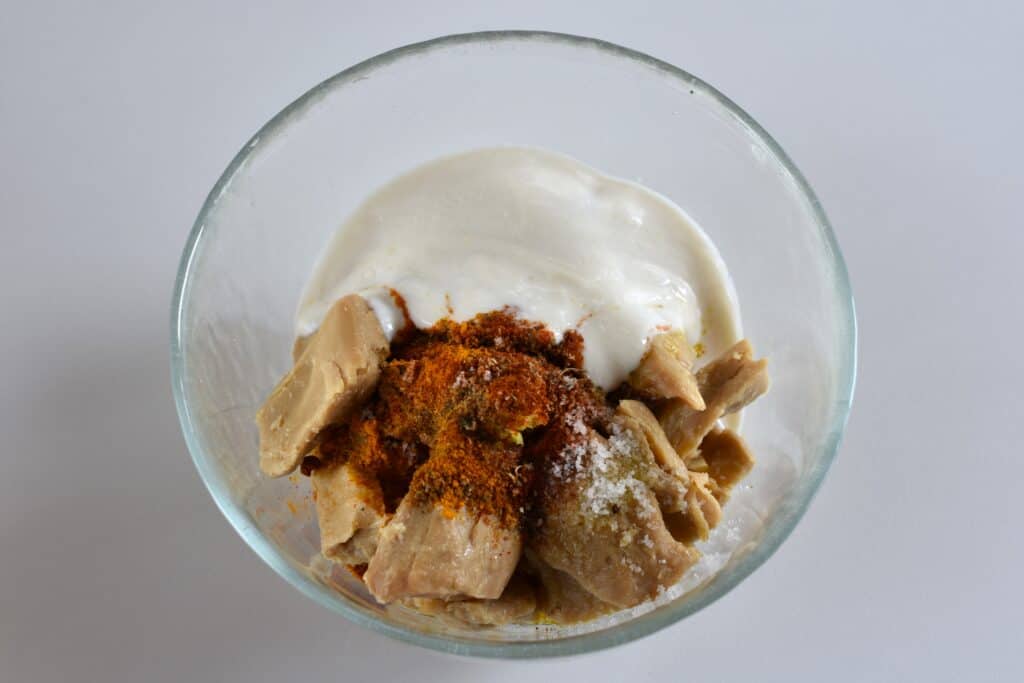
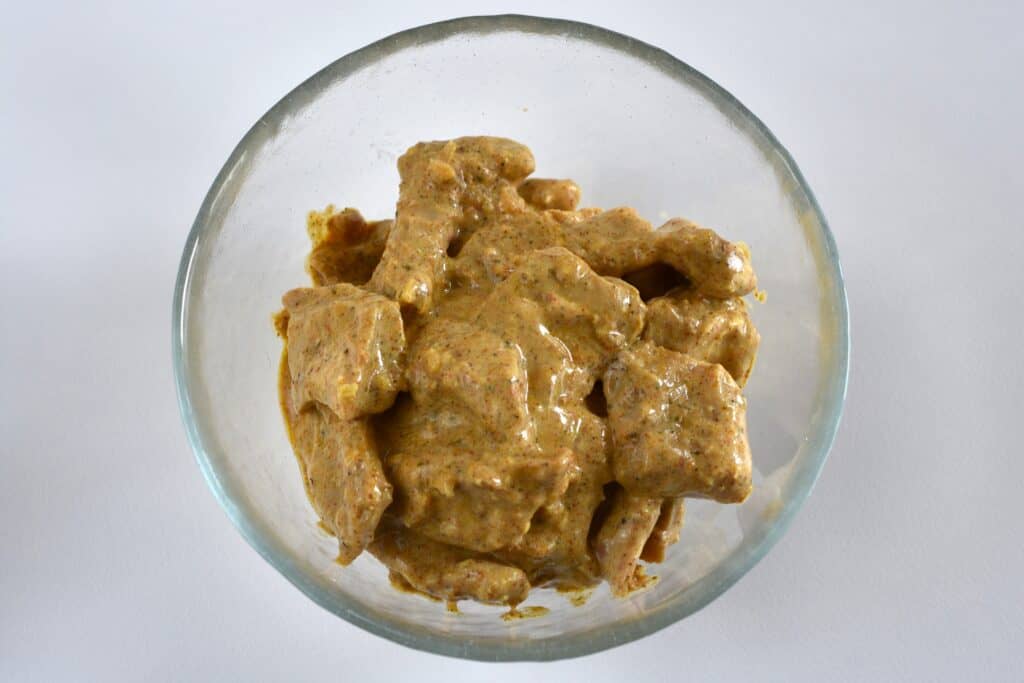
Fry the vegan chicken tikka chunks
Put half of the coconut oil in a pan and heat it up. When hot, add the marinated chunks of vegan chicken and fry on medium heat for about 3 minutes on each side until they are golden brown. Remove from the pan and set aside.
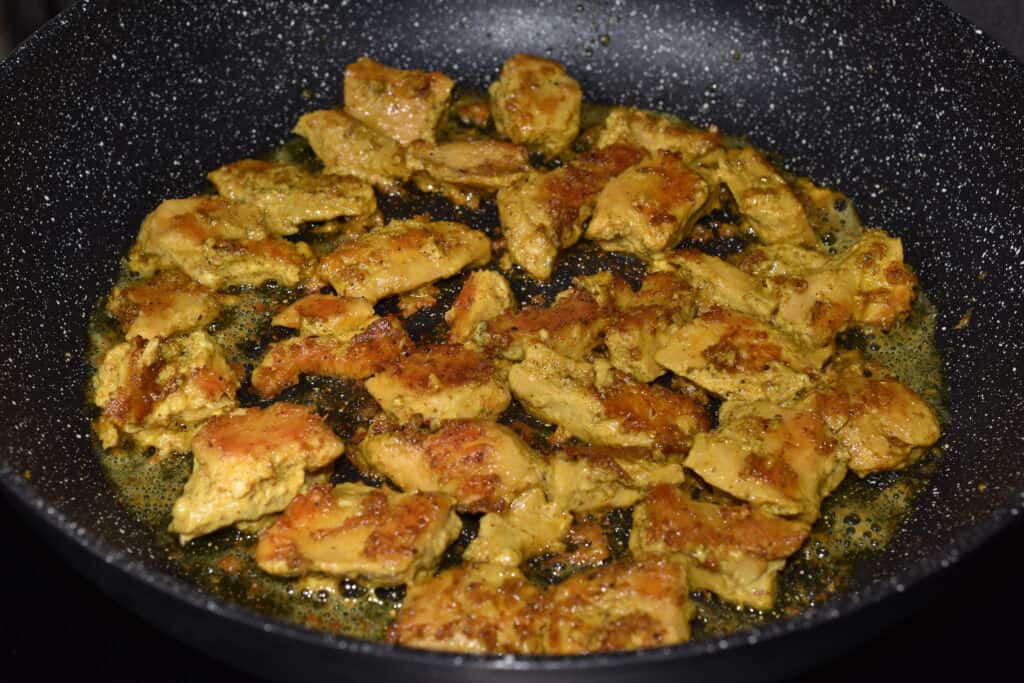
Prepare the masala sauce
- Wipe the pan and add the rest of the coconut oil. Heat the oil up until hot but not smoking. Make a long slit all the way down one side of the red chili pepper and add it to the hot oil.
- Add the spices to the pan and stir with a wooden spoon for a few seconds.
- Add the crushed garlic, grated ginger and chopped onion. Sauté on low heat for about 10 minutes until soft and translucent. Turn the heat up to medium-high and continue to sauté the onions, garlic and ginger until they are just starting to brown.
- Add the tomato pulp and season with half the salt (½ tsp) and some freshly ground black pepper. Stir well and heat the mixture up. Cook it for a minute or two, with a lid on the pan, until the tomato pulp and spices are well amalgamated and any excess water from the tomatoes has evaporated. Remove from the heat and set aside.
- Prepare the side dishes for your vegan tikka masala (see separate recipes for perfect white or brown basmati rice). 10 minutes before your side dishes are ready, pour 250 grams of coconut milk into the curry. Heat it up and stir until the sauce is amalgamated.
- Add the vegan chicken tikka chunks and simmer on low heat for the last 10 minutes until the sauce is thick and creamy. Taste and correct the seasoning, adding the other half a teaspoon of salt if necessary. If you like your tikka masala quite hot, you could add a little cayenne pepper.

How to serve vegan chicken tikka masala
Just before serving, remove the red chili pepper and discard or cut it into pieces and leave it in the sauce for those who are courageous. Garnish with fresh coriander leaf. To balance out the heat in this dish, you can add a dollop of cool soya yoghurt just before serving. For restaurant-style results, hang the yoghurt first so that it is thick and creamy. See how to hang soya yoghurt here.
Serve your vegan chicken tikka masala with basmati rice, naan bread or roti. Fluffy, steamed brown basmati rice is the perfect healthy accompaniment for this dish. Steam-cooking rice using this fail-proof method will ensure you always have separate, light, fluffy grains with a tender but firm, slightly springy texture. Discover how to cook brown basmati rice to perfection – light, fluffy and fragrant – just like the rice they serve in the best Asian restaurants.

Alternatively, you could serve it with steamed white basmati rice or Indian flatbread.
If you are entertaining and want to serve a starter before your vegan chicken tikka masala, you can’t go wrong with onion bhaji served with cucumber raita and mango chutney.
Or you could treat your loved ones to a complete Indian meal!
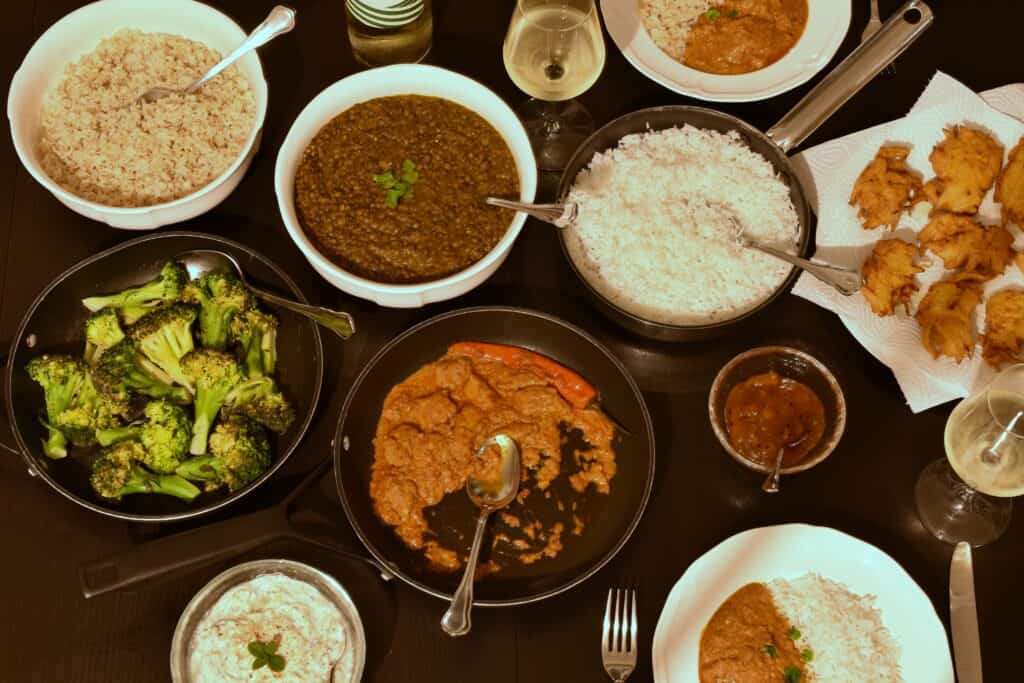
How to store leftovers
Store any leftovers in an airtight container in the fridge, where they will keep for 3 to 4 days.
Can you freeze vegan chicken tikka masala?
Vegan chicken tikka masala can be frozen. Freeze it in portions for convenience. I don’t recommend freezing it with rice as rice doesn’t fare very well in a domestic freezer – it changes the texture considerably. If you want to freeze an Indian meal for another day, flatbreads are a better choice than rice because they freeze better.
How to reheat
To reheat your vegan chicken tikka masala, put it in a pan with a lid on to prevent the sauce from drying out. Heat it up slowly on low heat. Add a tablespoon or two of water if necessary. Alternatively, you could heat it up in the microwave. If serving with basmati rice, it’s best to make it afresh.
To reheat vegan chicken tikka masala from frozen, first allow it to defrost and then proceed as above.

I’m sure you’ll love this vegan chicken tikka masala! If you do, it would be great if you could give it a 5-star rating and leave a comment below! It helps other readers to find my content and posts and ultimately makes my blog more successful! Thanks so much for your support! Deborah xx
While you’re here on Vegan Hot Stuff, maybe you’d like to take a look at some other popular recipes…
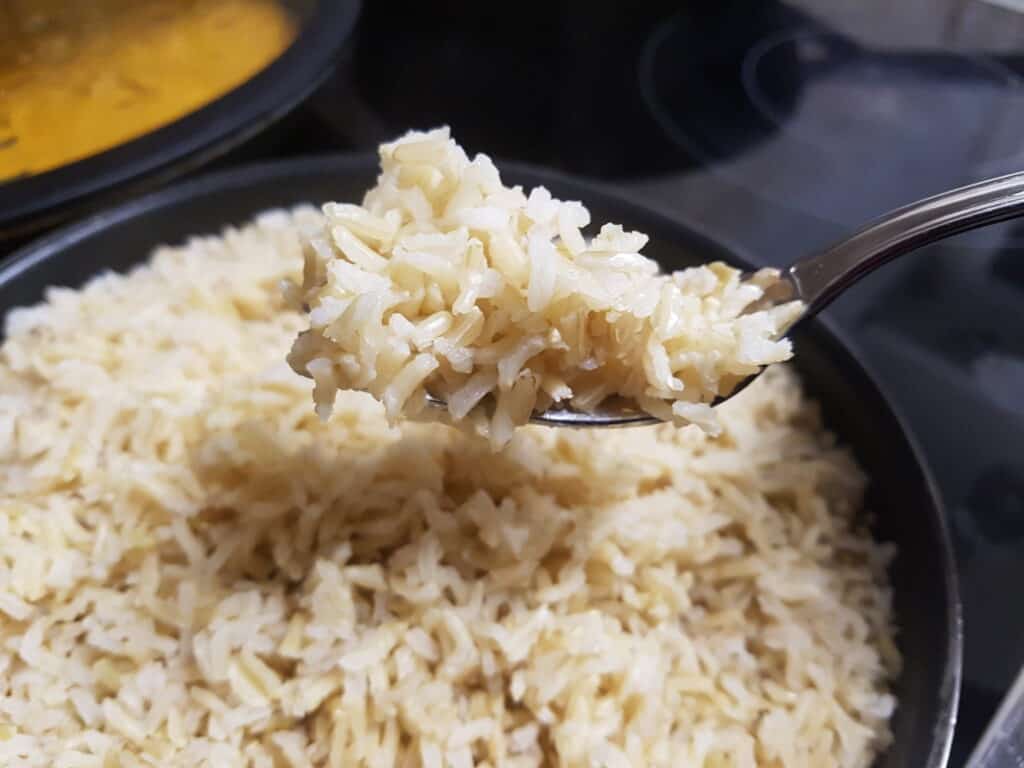
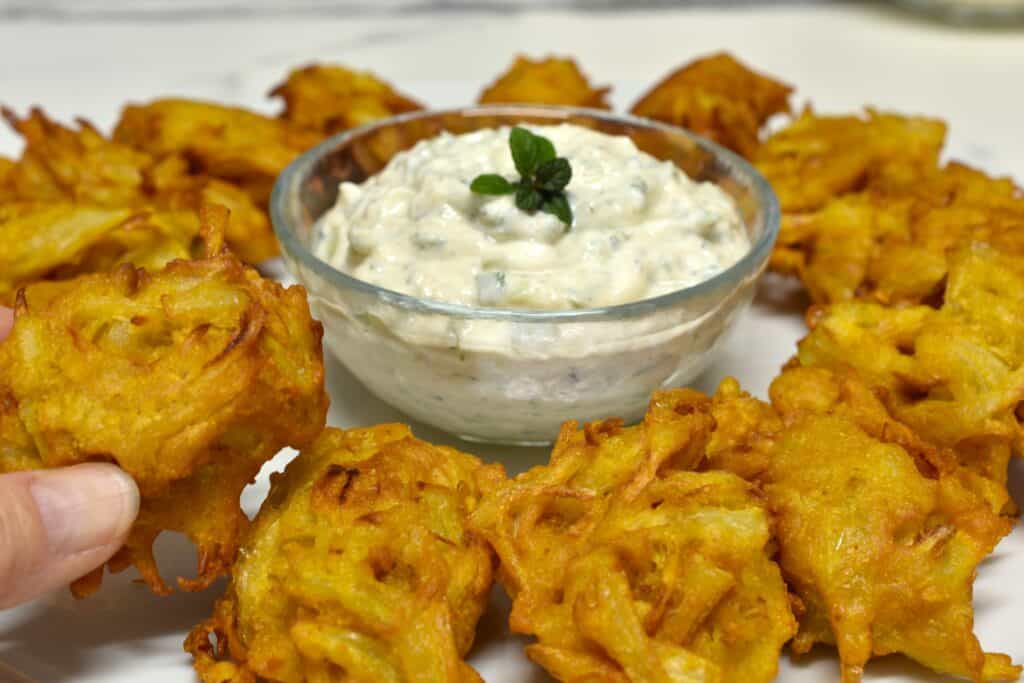
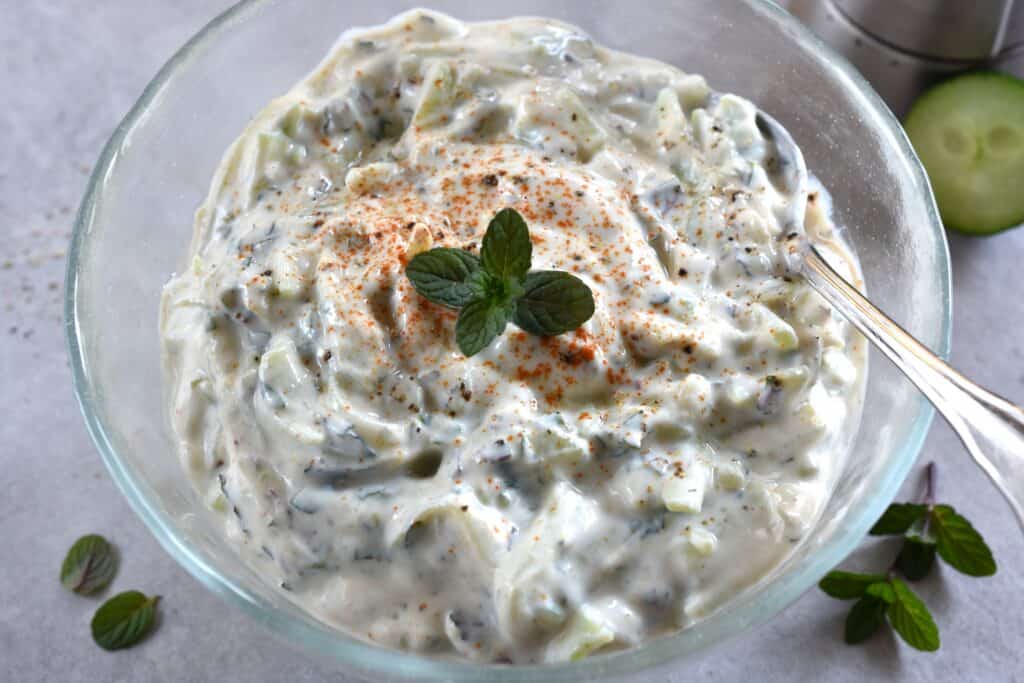
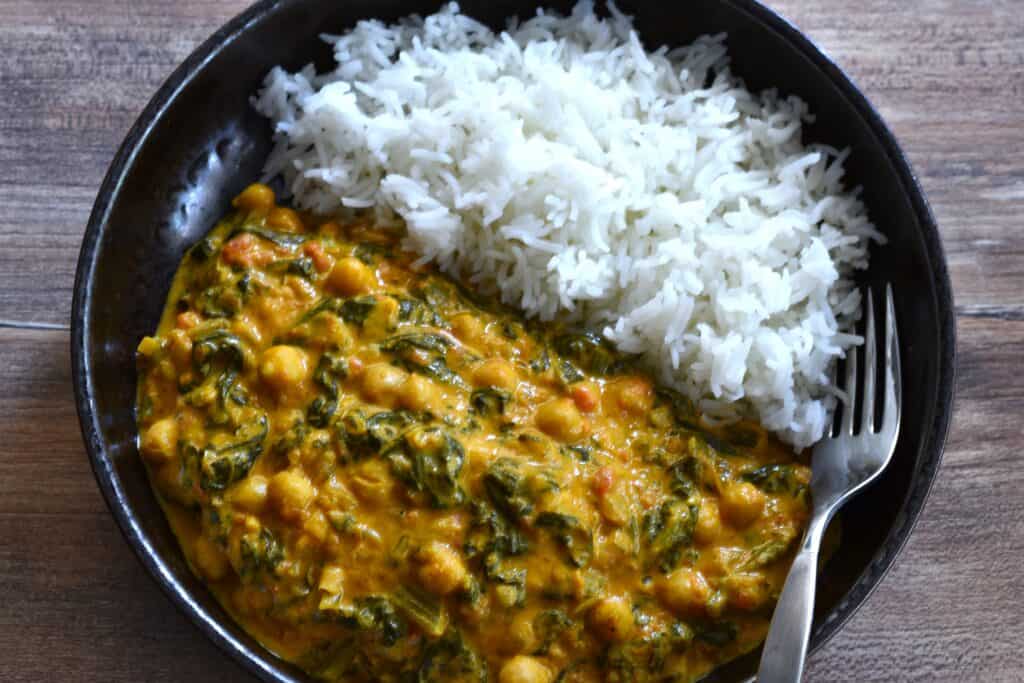
Would you like to receive my recipes as soon as I publish them? Subscribe below!


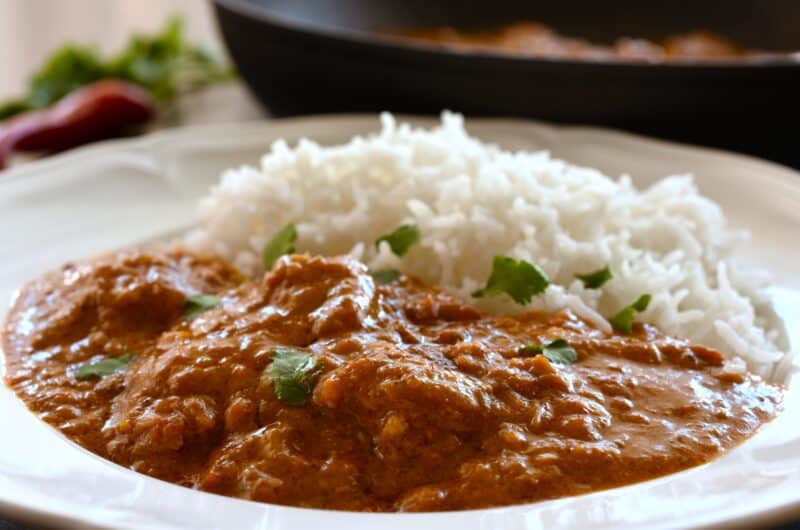

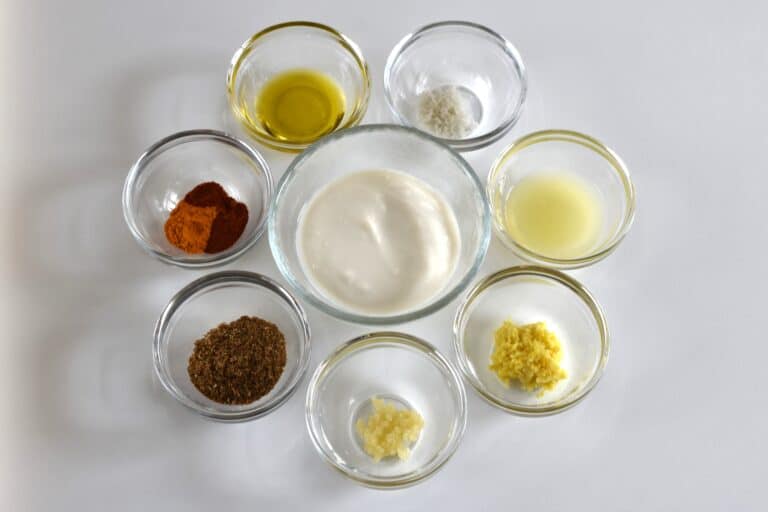

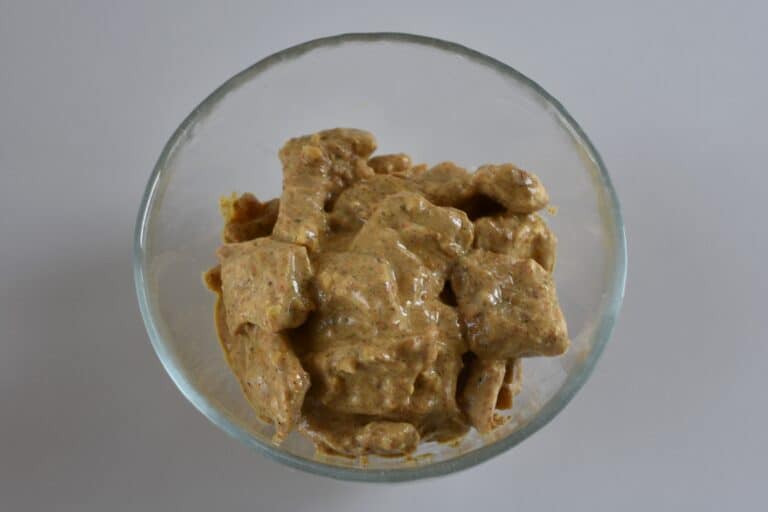

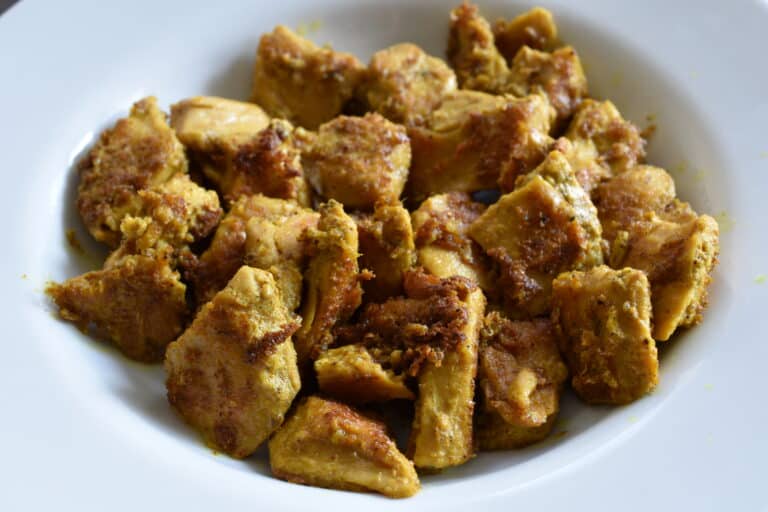




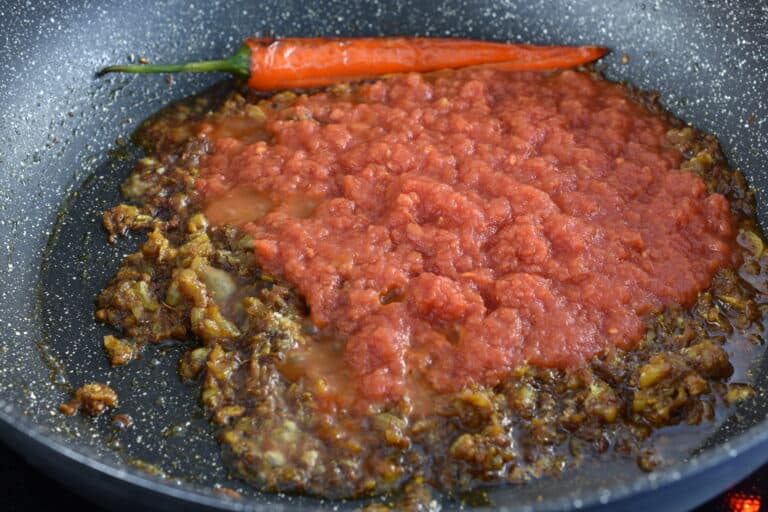

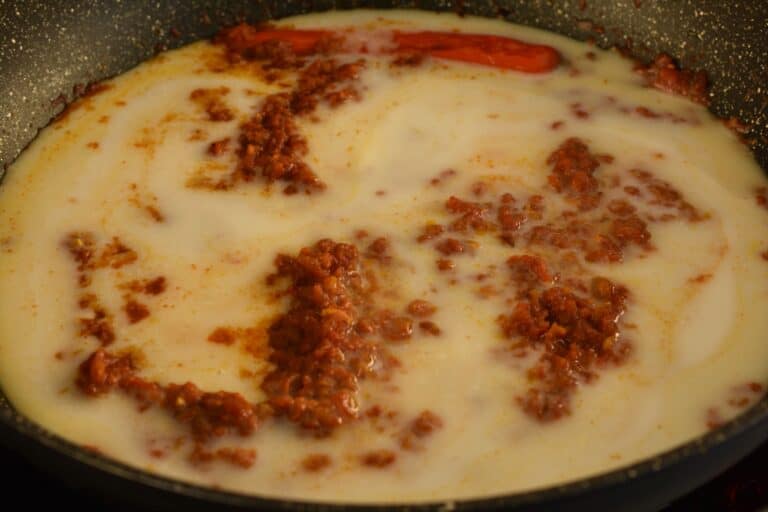
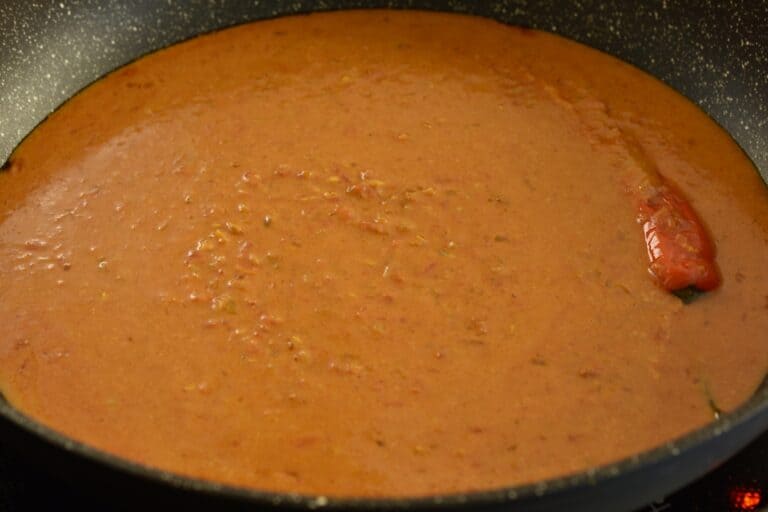
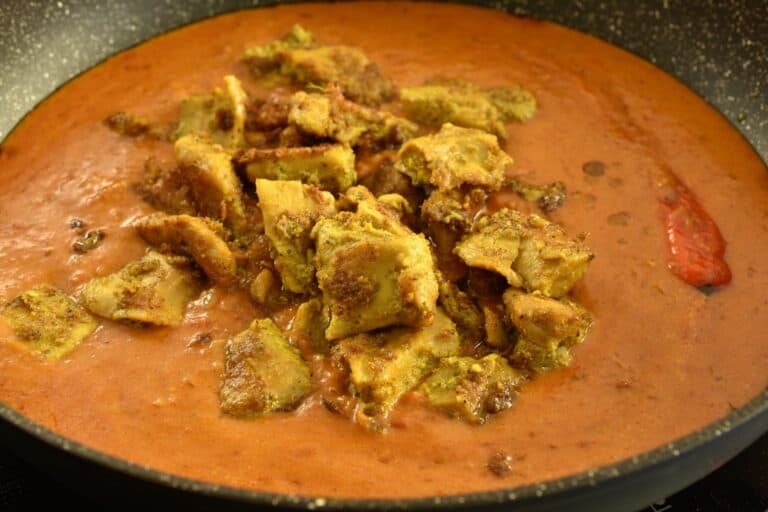
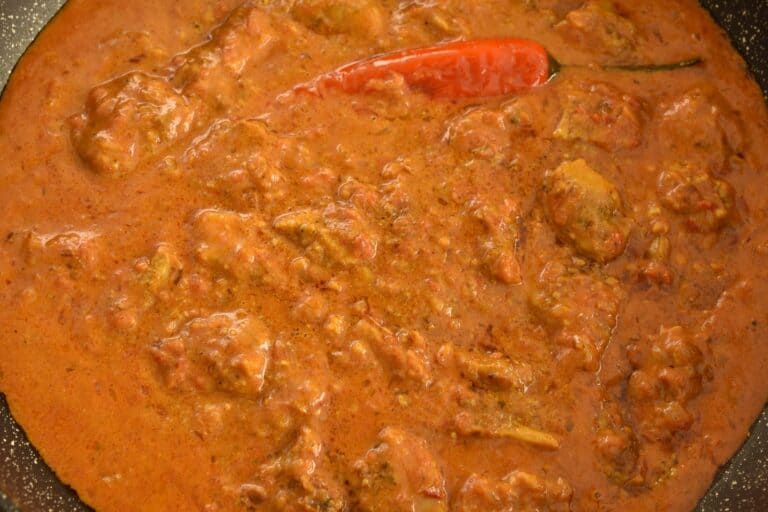
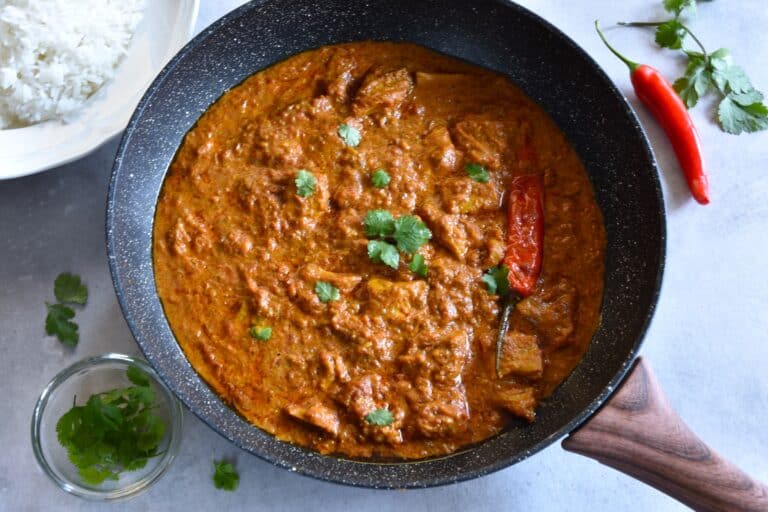
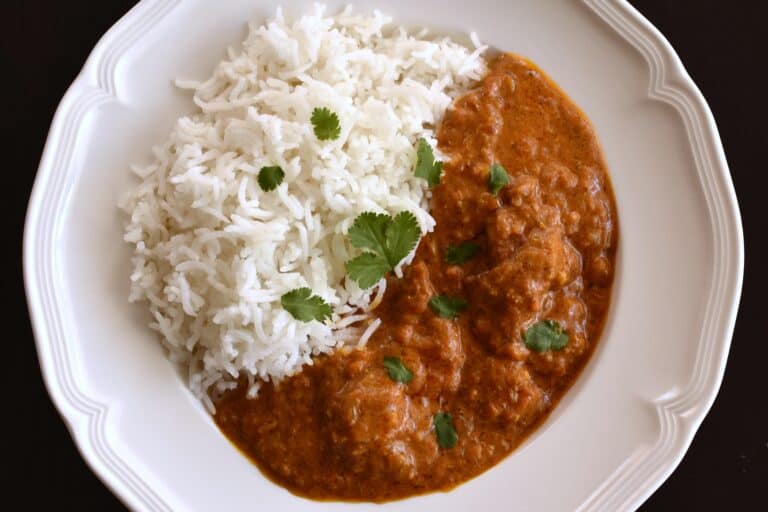
Molto buono!!
Grazie per la recensione! Sono contenta che ti sia piaciuto!